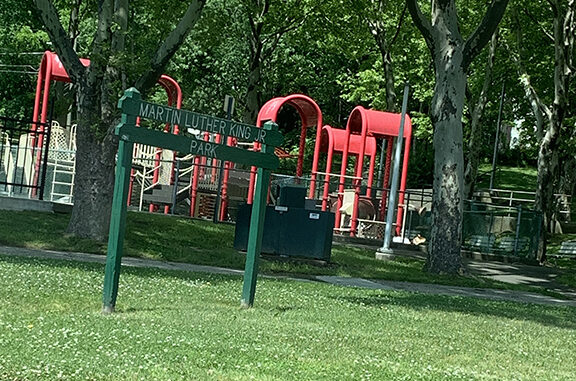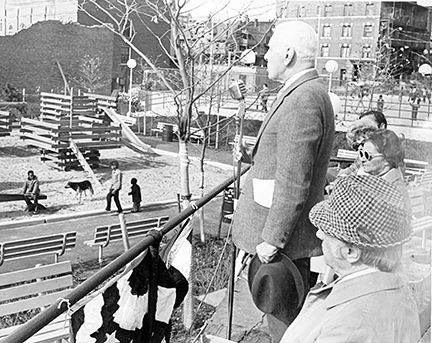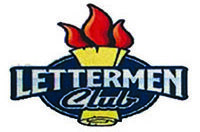
Among its umbrella of community-based initiatives in the city, the newly revived Lettermen Club has directed its efforts toward enhancing Martin Luther King Jr. Park in Waterbury, with an aim to help restore the park to its former glory as a thriving center of activity for the surrounding neighborhood.
Located near the city’s North Square, Martin Luther King Jr. Park has a storied history, with its roots dating back to some turbulent times for the city and nation.
One week after Martin Luther King Jr. was assassinated in Memphis in April 1968, members of the local Black Youth Movement proposed creating an inner-city park and naming it after the Civil Rights leader.
As possible locations and properties were being considered by city officials for a small park near North Square the following year, the neighborhood turned tumultuous as racial tensions fueled urban uprisings throughout the country.
Rioting and fires erupted in the North End over three consecutive nights during the summer of 1969. Tensions were eventually calmed, as a group of locals assisted authorities in patrolling the area and securing order.
Area residents continued to push for neighborhood improvements as plans for a park moved forward into the 1970s. After four years of wrangling over city properties and funding issues, work on the park began in 1973 on a site that included the demolition of some buildings affected by the rioting.
The park’s original layout covered an area at North Main, Bishop and East Hawkins streets, with the former Carroll Theater – a landmark for years in the North Square – to be converted into an additional park facility. But the city’s Park Department could not secure enough funds to rehabilitate the building. In the end, the old theater at one end of the park was also razed.
Created through local and state funding along with the help of $201,950 from an Open Spaces grant the city received from the U.S. Department of Housing and Urban Development, Martin Luther King Jr. Memorial Park was opened the weekend of November 3rd in 1973.

dedication of Martin Luther King Jr. Memorial Park on November 3, 1973.
Consisting of basketball courts, a playground area and benches, the small park was well received by neighborhood residents. Activities and programs filled seasonal schedules at MLK Park, which served as the first home of the now famous Pearl Street summer basketball league.
Decades of use have of course taken a toll on the park, which has seen minor enhancements over the years, with some centered around its 25th anniversary year, when community groups planned a number of events.
“When I was growing up, there were all kinds of activities held in the park,” recalled local resident David Love in a 1998 article in the Republican-American. “We see it as a rallying point to unite the community,” added Love, who was among the locals calling for more park improvements during that anniversary year.
While some enhancements have occurred, conditions at MLK Park have more recently deteriorated to the point where very few community activities are regularly held, while such negative elements as drug dealing have surfaced on the site.
As the park approaches its 50-year mark, there has been another push for rejuvenation, sparked by the efforts of various community groups and championed by the Lettermen Club.
A pair of projects for the summer of 2022 were approved by the Waterbury Board of Park Commissioners. The first project was a collaborative effort by AI3 Leadership Academy and Full Court Peace to refurbish the basketball courts at Martin Luther King Park.
In June and July, local youth took part in the effort, helping to complete a resurfacing along with the replacement of rims and backboards at the MLK courts.
The effort included assistance from other organizations, including Mizz-Werk, CT Focus, CT Rebound, Connecticut Unity, Watertown basketball, Connecticut Dream, YMCA Berkeley Warner Recreation, Role Models/Summer Shutdown, Make Em Believe Basketball, Hoops4life, Neighborhood Housing Services and CO Sports Academy.
The second project, initiated by the Lettermen Club, was to dedicate and name the courts at Martin Luther King Park after Hubie Williamson. The Lettermen club, founded by Hubie, was an organization of former athletes involved in various community projects and activities. It has recently been revived under the leadership of Hubie’s longtime friend James Monroe and former Wilby High School star Lou Canady.
Sparked by these developments, the groups envision them as just the first steps in enhancing and preserving a park central to the community’s racial and basketball heritage
Additional steps under consideration include efforts to:
• Install security cameras that will not only feed into the police communications room but also feed into a link on the AI3 Leadership Academy webpage – where kids would be able to see who is playing at the park and parents would be able to view what their children are doing there.
• Develop and enhance a safe and enjoyable park environment and culture.
• Expose the younger generation of players to Hubie’s legacy and Martin Luther King’s teachings.
• Sponsor a celebratory “Swish is a Summer Sound” tournament or league, and provide “collector item” T-shirts – that can only be obtained by signing a pledge to protect and preserve MLK Park and to adopt and adhere to the wisdom of Martin Luther King’s adage that “It is always the right time to do the right thing.”
